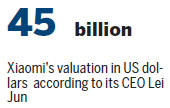Going West? Xiaomi news may set alarms to HKEx
Updated: 2015-02-10 07:44
By Gladdy Chu in Hong Kong(HK Edition)
|
|||||||||
Xiaomi may be headed the Alibaba way, if market information proves true.
It appears the hugely successful mainland smartphone maker is planning to go public in the US instead of Hong Kong, once again over the inadmissibility of a weighted voting right structure for Hong Kong-listed companies.
If this comes to pass, it would mark the second time Hong Kong loses out on big listings from high-profile mainland technology-and-Internet related companies because of its "one share, one vote" policy.
However, a source in Xiaomi, when contacted on Monday, said the Beijing-based company will not be going public within the next five years, in effect repeating the comments made by Xiaomi CEO Lei Jun in November.
Mainland e-commerce giant Alibaba chose New York, which allows a dual class share structure, over Hong Kong for its world record $25 billion IPO in September. Xiaomi, founded in 2010, was valued at $45 billion, according to Lei.
Edward Au, co-leader of National Public Offering Group at Deloitte China, however believes it is unlikely the Hong Kong stock exchange will speed up relevant consultation on a rule change because of pressure from the loss of successive IPOs.
"Besides regulations controlled by HKEx (Hong Kong Exchanges and Clearing Ltd), there are many amendments resting on other official institutions such as the Securities and Futures Commission (SFC), Legislative Council, and the SAR government," Au said. "The process of change is on the way, but it will still need time to get going."
The Hong Kong stock exchange launched a concept paper in August on weighted voting rights, shortly after Alibaba announced plans to list in New York. The concept paper sought views on whether governance structures that give certain persons voting power or other related rights disproportionate to their shareholding (in other words, a weighted voting right structure) should be permissible for companies listed or seeking to list on the bourse.
"I think many parties hold a positive attitude toward such change in response to the concept paper," Au said. "But more decisions about new rules will be left to further consultations."
"According to the SFC's current corporate merger and takeover provision, the acquirer can make the acquired company a wholly owned subsidiary by buying 30 percent of its shares," Au said in citing an example. "To allow the weighted voting rights structure, there will be a review of the '30 percent' in further discussions."
Ringo Choi, Asia-Pacific IPO leader at Ernst & Young, said since Hong Kong is working toward such reform, the only question is the timing.
"It depends on when the matched supervisory scheme comes out," Choi said. "On the premise that investor interest is guaranteed, a more flexible structure would generate more opportunities for the Hong Kong stock market."
Though the market believes there will be more mainland telecommunications, media, and technology (TMT) companies coming to Hong Kong for IPOs if a 'minority-control voting structure' is applied, Deloitte's Au feels it will not be a booming sector of the Hong Kong stock market in the near future even if "weighted voting rights" become acceptable.
"Since there are more technology-tracked funds in the US, these companies will capture a higher valuation when seeking IPOs there," he said.
"Compared with the three strongest sectors in the Hong Kong stock market-financial services, property and retail consumption - investment funds tracked on technology stocks are quite limited," Au said.
"If Hong Kong intends to attract more TMT firms, as well as Internet and e-commerce companies, to go public in its market, the city should first make an effort to draw more TMT-tracked funds," he said.
|
The shift of voting structure may not help to attract more high-tech companies to the Hong Kong bourse, analysts say. Brent Lewin / Bloomberg |

(HK Edition 02/10/2015 page8)
